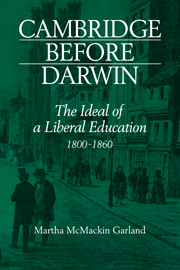Book contents
6 - The challenge of Darwin
Published online by Cambridge University Press: 07 October 2011
Summary
In the natural sciences as in moral philosophy, mathematics, theology, and literature, the Cambridge dons were committed to presenting and defending a unitary vision of truth. No matter from what perspective they viewed the natural universe, they expected to see a coherent, consistent picture. And this consistency would not merely exist among the various sciences, but also between the sciences and the humanities. In particular natural theology and natural science were seen as two sides of a single coin. In each case the raw subject matter was nature: natural theology helped to reveal the existence and the aspects of nature's Creator, while science demonstrated the mechanisms by which the Creator chose to work.
As with the other university disciplines, Cambridge science saw a great deal of development and change during the first half of the nineteenth century. And like theology, literary criticism, and the very idea of a liberal education, science at mid-century was approaching a disintegrative intellectual crisis – in this case one which can be at least symbolically tied to a specific event, the 1859 publication of The Origin of Species. It is tempting to assert that Darwin destroyed the Christian faith of the earlier age: to say that by replacing an intervening anthropomorphic God with an impersonal evolutionary force, by rejecting the creation story of Genesis, and by describing a nature-red-in-tooth-and-claw instead of one full of evident beneficence, he had made intellectually untenable the old Christian cosmogony. This would be over-simple and wrong. There were as many Christians in the English intellectual community after 1859 as before. What Darwin's work had done was wrest apart two previously united aspects of truth.
- Type
- Chapter
- Information
- Cambridge Before DarwinThe Ideal of a Liberal Education, 1800–1860, pp. 90 - 112Publisher: Cambridge University PressPrint publication year: 1980



